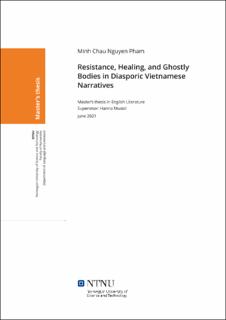| dc.description.abstract | Drawing on Jean Langford’s, Achille Mbembe’s and Viet Thanh Nguyen’s respective works on migration, ghost, and consolation, this thesis focuses on diasporic Vietnamese narratives as healing practices. Specifically, the project explores how Thi Bui’s graphic memoir The Best We Could Do and Ocean Vuong’s autobiographical novel On Earth We’re Briefly Gorgeous narrate resistance and healing through the figure of the ghost. Chapter One explores Bui’s text through the lens of Hillary Chute’s Disaster Drawn, arguing that Bui employs the techniques of spatialization and of combining multiple media (photographs and official documents). Not only do these techniques confront and deconstruct the political artefacts that have rendered the Vietnamese non-intimate and non-personal, but they also console the wounded Vietnamese bodies. Chapter Two explores Vuong’s work through Sandeep Bakshi’s scholarship on “decolonial queer diasporas,” arguing that Vuong focuses on the body and its organs as narrative devices in order to reopen “the colonial wound” and signals towards healing through sensations (Bakshi 544). I conclude the thesis by arguing that Bui’s book ventures towards a healing that is rooted in a heteroreproductive future, whereas Vuong’s text views the body as having the regenerative capacity for healing the wound. | |
